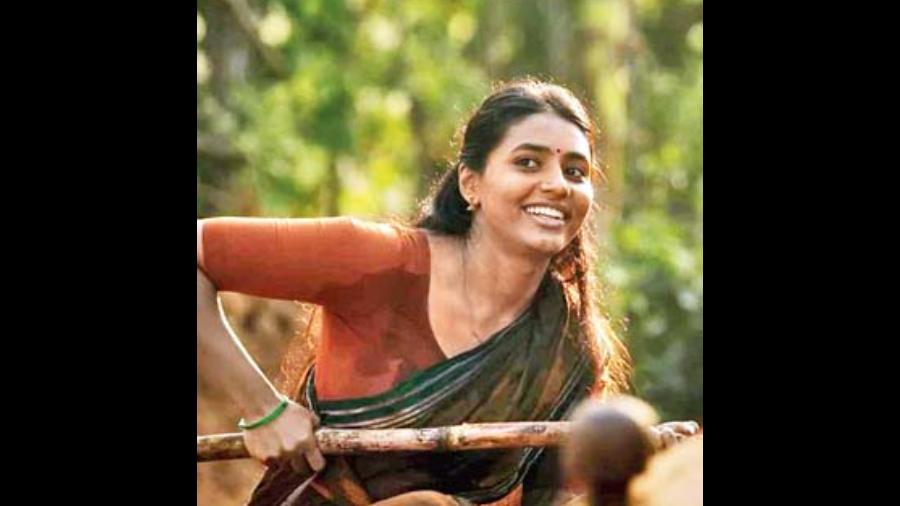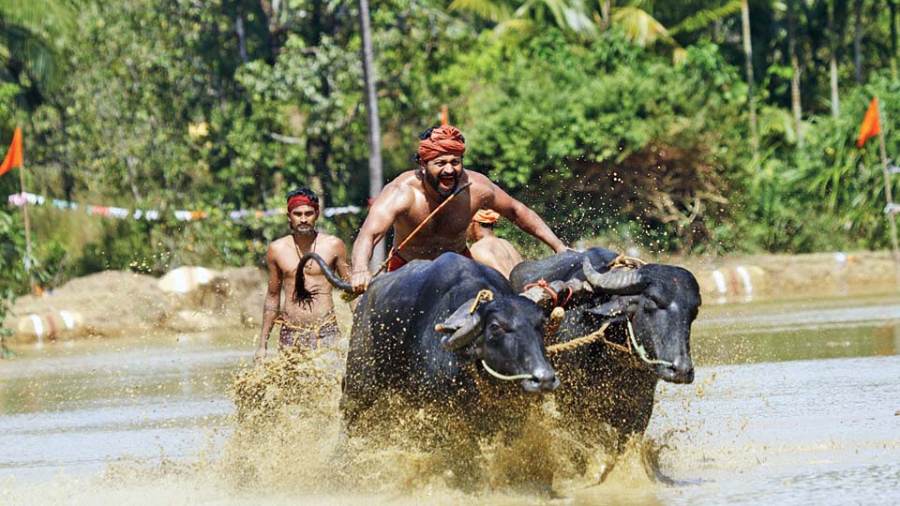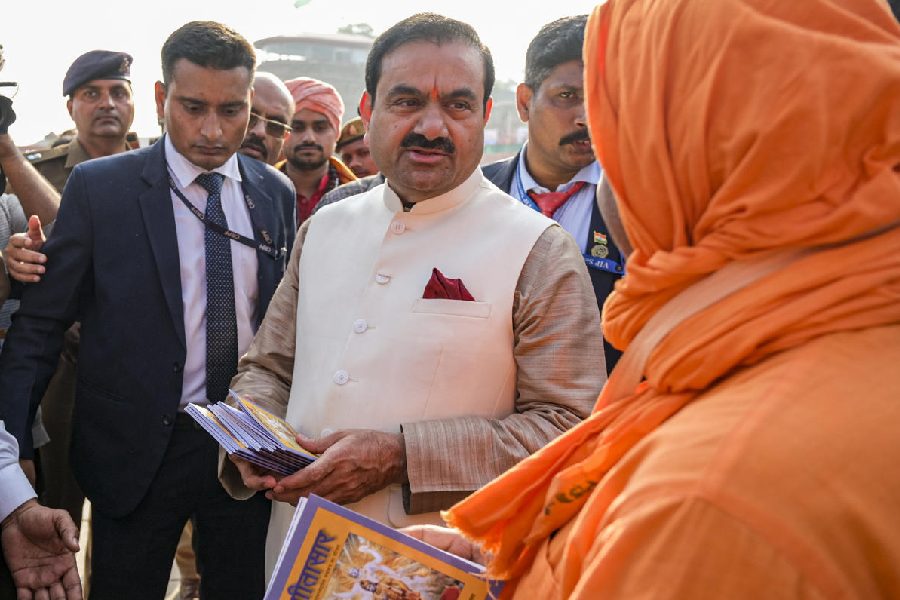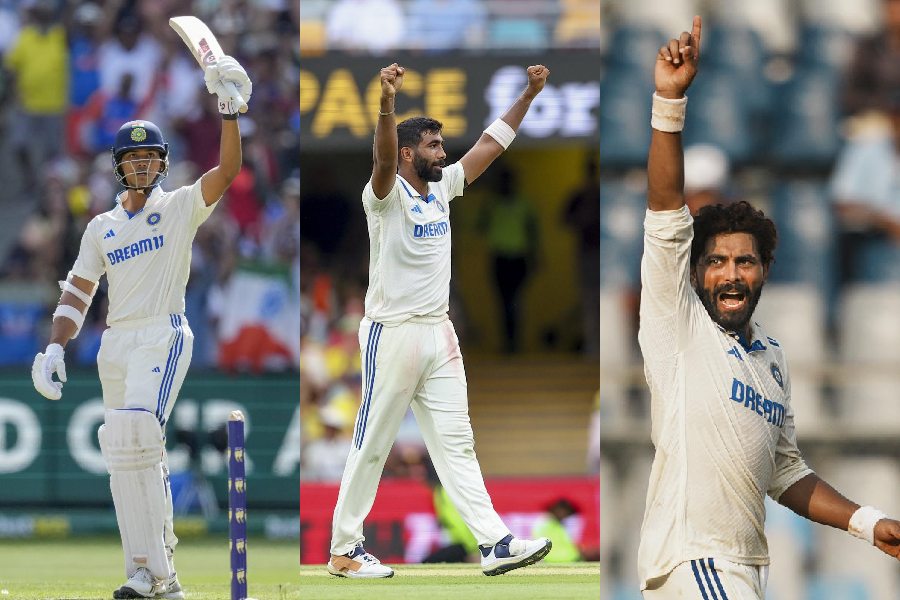It is a phenomenon, in the true sense of the term. Kannada film Kantara — which became a box-office sensation when it released in Karnataka on September 30 — and has become a huge hit globally after its wide release in Hindi last Friday, is getting bigger by the minute, quickly breaching the Rs 100-crore milestone and drawing in huge crowds. On movie database site IMDb, based on audience votes, Kantara has a rating of 9.4/10. To put things in perspective, the two biggest Hollywood films of 2022 so far — Top Gun: Maverick and Doctor Stranger in the Multiverse of Madness have an IMDb rating of 8.4/10 and 7.0/10, respectively.
Meaning ‘mythical forest’, Kantara winningly meshes folklore and fantasy, telling a story that’s rooted in its culture and yet touching upon universal themes like the man vs nature conflict. The man behind the unprecedented success of Kantara is Rishab Shetty, who has written and directed the film and also stars as the protagonist Shiva, a Kambala champion who is at loggerheads with an upright forest officer (played by Kishore), with the film playing out over three timelines. Achyuth Kumar and Sapthami Gowda feature in supporting roles. Over a Zoom call, t2 chatted with Shetty on his film.
Kantara is, of course, a phenomenon. When you made this film, did you ever think it would become so big so soon?
I always knew that I had a good story that the audiences would love. This is a story that always had the potential to connect universally. Regional and rooted content presented in this kind of a global showcase always works. I went in with that thought, and the audiences have only reaffirmed my belief.
When I make a film, the primary thought is that it shouldn’t bore me! (Laughs) If I get bored, then the audience will get even more bored!
This is a prime example of a film that makes the regional universal. What was the thought behind Kantara?
This is a film that actually didn’t figure in the list of films that I wanted to make. During the second lockdown, the idea struck me about making a film on the man vs nature conflict, based on the face-off between a villager and a forest officer around the subject of illegal hunting. I wanted to show the conflict between two male egos, but also that between humans and nature. With an agricultural land as the backdrop, I wanted to tell what I thought was an extremely important story, but also make it interesting.
The initial trigger for me was the fact that the agricultural land in coastal Karnataka is our way of life and our source of sustenance. It also defines our culture and determines aspects of our folklore.
In these areas, we worship Daiva (an animist form of spirit worship in the coastal districts of Tulu Nadu and some parts of Malenadu of Karnataka and Kasargod in northern Kerala). The film shows Bhoota Kola, which is a highly stylised dance held in honour of the local deities worshipped by the Tulu speaking population. Daiva forms the bridge between man and nature and I thought a story built around this would connect universally because in every corner of India, some form or the other of Daiva is worshipped. There must be similar rituals in every culture of the country. India is an agriculture-driven land and I knew that this idea would connect widely.
I have attempted to make a film, which as you said, makes the regional universal. And yet, this is a uniquely rooted story, a gaon ka story which you will not find in world cinema or on an OTT platform. It’s important to now make content around our core, around what keeps us close to our roots.
The film is a wholesome viewing experience, with that rocker of a climax giving audiences goosebumps. What were the challenges of shooting that?
Yes, that’s been the overwhelming feedback. The Bhoota Kola sequence in the climax where most of the primary characters are present has been singled out for huge praise. Honestly, this sequence, as well as the film as a whole, was not just a film for us... we approached it like a war (laughs).
Within four months of having the idea of the film, we went into pre-production. A lot of people around me got scared because I went into making this film like a soldier. I had to get the sets up, prepare for the action sequences, learn the dance form... all the departments worked together in tandem and when we got done with the film, we felt we had won a war.
So do you get into every film on a war footing or is Kantara special?
This was more because before this, I hadn’t made a film on such a huge scale and with such a big budget. Before Kantara, I hadn’t had so many people on the sets of any film before... so much so that I got scared when I saw so many people on the first day!
With your film now finding an audience all over the country, how do you react to the term ‘pan-India?’
I think we have overused this term. I don’t really believe in it. Cinema is cinema, and it is because of the changing tastes and altered perspectives of our audiences that all kinds of stories, no matter how niche or regional they are, are being accepted. The barrier of language has been removed and Indian cinema, as a whole, is being watched. Kantara is not a Kannada film, it is an Indian film.

Sapthami Gowda plays Leela in Kantara
Feedback so far
A lot of people have spoken about the movie as well as my performance. The language that we have used in the Kannada version is Mangalore Kannada and I had to learn it from scratch. I had to learn, shoot and also dub in that language. The audiences, especially those in Mangalore, Kundapura and Ooty and other towns along the coastal belt, have messaged me that it doesn’t look like I just learnt this language... it feels like I was born and brought up there.
For me, the most important thing was that I shouldn’t look out of place in the film in any way. Getting this kind of feedback and compliments satisfies the questions I had when I started out.
Twitter feedbacks

Dhanush @dhanushkraja
Kantara .. Mind blowing !! A must watch .. Rishab Shetty , you should be very proud of yourself. Congratulations hombale films .. keep pushing the boundaries. A big hug to all the actors and technicians of the film. God bless
Shilpa Shetty @theshilpashetty
Appreciation post for #kantara. Watched the film in the theatre…OMG! What a narrative, emotion, vibe and world. Had goose bumps during the climax .. The POWER OF CINEMA , transports the watcher into this world .. A world I belong to , really took me back to my roots.
Ram Gopal Varma @RGVzoomin
@shetty_rishab destroys the myth in film people that only mega budget films will pull people into theatres .. #Kantara will be a major lesson for decades to come
Madhur Bhandarkar @imbhandarkar
#Kantara is cinematic scintillating experience one should not miss, captivating background score, brilliant cinematography, Splendidly directed & flawlessly acted by @shetty_rishab, the climax gave me goosebumps with moist eyes. I am just Spellbound. Congrats to the entire team.
Challenges
Leela has to convey a lot without saying much. That had to be done in a way that even a slightest look from me had to convey a lot. I had to work on that a lot as well as the characterisation of Leela, in terms of why she behaves the way she does in certain situations.
I went through a workshop for two months and we worked on her characterisation and her dialogues. The entire shooting process was a learning curve for me. We had a lot of artistes from Mangalore in this film and their contribution to this film is massive. They do skits on a daily basis and they can improvise any scene in a matter of seconds. Their approach helped me a lot in
deep-diving into my character and understanding her nuances.











